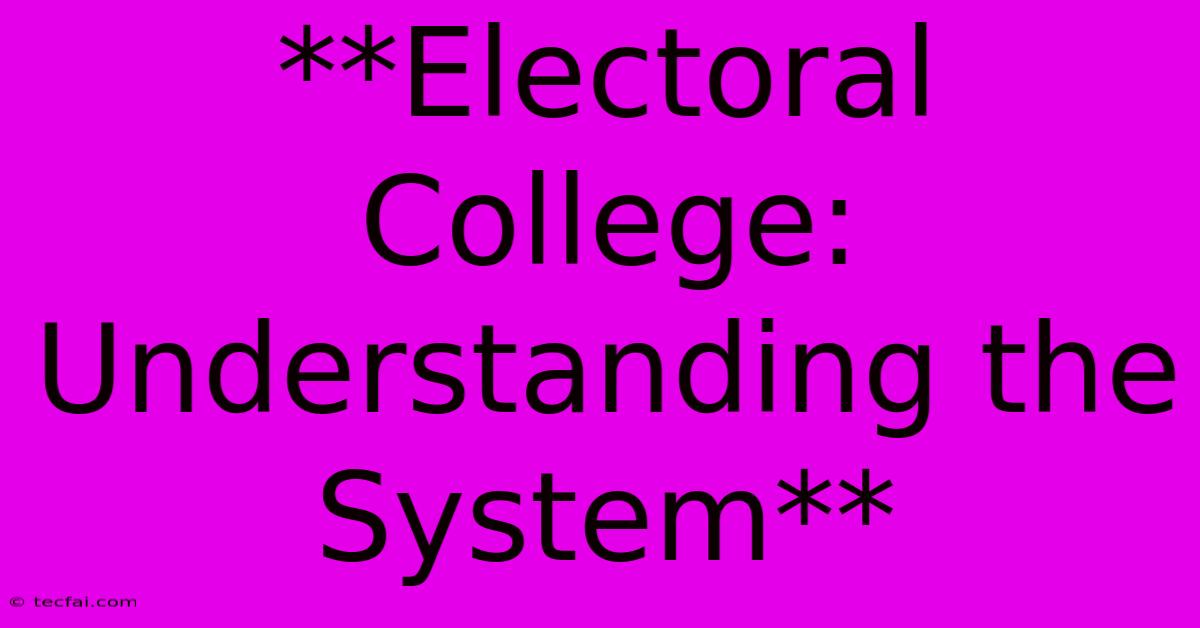**Electoral College: Understanding The System**

Discover more detailed and exciting information on our website. Click the link below to start your adventure: Visit Best Website tecfai.com. Don't miss out!
Table of Contents
Electoral College: Understanding the System
The United States Presidential election is a complex process, with the Electoral College playing a central role in determining the winner. While many Americans are familiar with the concept of the Electoral College, understanding its intricacies and potential implications can be challenging. This article aims to shed light on the system, exploring its history, mechanics, and ongoing debate surrounding its relevance in modern-day America.
A Historical Perspective
The Electoral College was established by the Founding Fathers during the Constitutional Convention of 1787. Its primary purpose was to balance the interests of large and small states, ensuring that no single state held disproportionate power in electing the president. The system also aimed to prevent the potential for a popular candidate with widespread support across a few states from winning the presidency without gaining broader national acceptance.
How the Electoral College Works
The Electoral College system is a multi-step process:
- Electoral Votes: Each state is allocated a number of electors based on its total congressional representation (House of Representatives and Senate). Additionally, the District of Columbia receives three electoral votes. This means that states with larger populations generally have more electors than smaller states.
- Candidate Selection: During the general election, voters cast ballots for their preferred presidential and vice-presidential candidates. In most states, the candidate who receives the most votes wins all of that state's electors, known as the "winner-take-all" system. This aspect of the system is often criticized for creating a situation where a candidate can win the popular vote nationwide but still lose the election.
- Electoral Vote Threshold: To win the presidency, a candidate needs to secure a majority of the 538 electoral votes. This means a candidate needs at least 270 electoral votes to win. If no candidate reaches the majority threshold, the election is decided by the House of Representatives.
Criticisms of the Electoral College
The Electoral College system has been a source of debate for decades. Common criticisms include:
- Popular Vote vs. Electoral Vote Discrepancies: The system can result in a candidate winning the presidency despite losing the popular vote, which happened in 2000 and 2016. This outcome can create a perception that the will of the majority is not reflected in the election results.
- Disenfranchisement of Certain Voters: Critics argue that the "winner-take-all" system disproportionately benefits candidates who focus on swing states, while voters in less-contested states have less influence on the election outcome. This can lead to a situation where certain voters feel their votes hold less weight than others.
- Potential for Unforeseen Outcomes: The Electoral College can create scenarios where a third-party candidate could win the presidency without securing the most votes, potentially leading to political instability.
Arguments in Favor of the Electoral College
Despite the criticisms, there are arguments in favor of the Electoral College:
- Ensuring National Representation: Supporters argue that the system helps ensure that candidates need to gain support across a wide range of states, fostering a sense of national unity rather than focusing solely on densely populated urban areas.
- Preventing Tyranny of the Majority: The system is designed to prevent a candidate from winning the presidency based solely on the votes of a few large states, potentially leading to a more balanced and representative government.
- Historical Significance: The Electoral College is deeply ingrained in American history and tradition, with strong ties to the Constitution and its original purpose.
The Future of the Electoral College
The debate over the Electoral College is likely to continue. Proposals for reform include abolishing the system entirely and adopting a national popular vote system or implementing a proportional allocation of electoral votes within each state. The future of the Electoral College remains uncertain, with its continued relevance and potential for reform subject to ongoing discussions and political considerations.
In conclusion, understanding the Electoral College is crucial for engaging in informed political discourse. While the system has its merits and flaws, it remains a defining element of the American political landscape, shaping presidential elections and sparking ongoing debates about its role in the democratic process. As the nation evolves, the future of the Electoral College and its impact on the political landscape will continue to be a subject of significant scrutiny and debate.

Thank you for visiting our website wich cover about **Electoral College: Understanding The System**. We hope the information provided has been useful to you. Feel free to contact us if you have any questions or need further assistance. See you next time and dont miss to bookmark.
Featured Posts
-
Nike Alpha Fly 3 Sa Metallic Medium Ash
Nov 06, 2024
-
Fox News Outpaces Rivals In Election Viewership
Nov 06, 2024
-
Bristol City 1 2 Sheffield United Match Recap
Nov 06, 2024
-
Who Is Jill Stein Green Party Platform
Nov 06, 2024
-
Jd Vance Forecasts Win In Upcoming Speech
Nov 06, 2024
